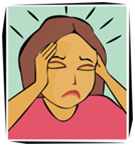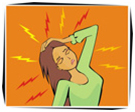Migraine is an intense, often unbearable type of headache found more commonly in women than in men. The pain can be so intense that it negatively affects your quality of life and day-to-day routine activities. Although much about headaches is still not clear, some researchers think migraines may be caused partly due to fluctuations in the balance of a body chemical called serotonin.
High-serotonin levels cause your blood vessels to constrict. When the levels of serotonin drop, it causes your blood vessels to dilate or swell resulting in a bad, throbbing headache. |

|
Migraines may last from 4 to 72 hours. They may happen only once or twice a year, or as often as daily. Migraine headaches often begin in adolescence, and are found to be rare in individuals above the age of 60.
|
Types of migraine
There are two types of migraine headaches - classic migraine and common migraine.
|
- Classic migraine: This type of migraine is preceded or accompanied by certain warning signs. You generally feel a sort of aura around you which includes seeing lights flashing, an array of colors, hallucinations, blurred vision, blind spots, numb or tingling feeling in the arms and legs and a temporary loss of vision, especially your side vision. It is also accompanied by emotional disturbances such as feelings of depression, irritability and an overall feeling of uneasiness. Classic migraine can cause headache on one or both sides of your head.
- Common migraine: You will not feel any aura with common migraines. They begin slowly and last longer than classic migraines. With common migraines the pain is felt on only one side of your head.
|

|
Symptoms of migraine
The symptoms of migraine are not alike in all people. Different individuals experience symptoms differently. Some individuals have a sort of 'intuitive' feeling of an approaching migraine, hours before they get it. Before they get the migraine they may experience a sudden, unexplained spurt of energy, hunger, tiredness and/or mood swings. |
|
Common symptoms of migraine |
- Dull or severe ache on one or both sides of the head.
- Nausea or vomiting.
- Disturbances of vision.
- Irritability at bright lights, noise, odors.
- Fatigue.
- Feeling cold or sudden sweating.
|
Migraine triggers
The following are some of the factors that can trigger a migraine attack. You may get a migraine headache with one or more of the following factors: |
- Bright lights, strange odors or shrill noises.
- Fatigue, stress or other emotional disturbances.
- Extreme weather.
- High altitudes.
- Disturbed sleep, lack of sleep.
- Menstrual periods, birth control pills or hormones.
- Alcohol, smoking.
- Intense physical activity including sexual activity.
- Certain medications.
- Certain foods.
- Irregular eating patterns—missed meals or fasting.
|
Seeking medical help
Fortunately, with the advances in modern day medicine, migraines can be treated effectively. Medications used to treat migraines fall into two broad categories: |
- Pain-relieving medications: These medications are taken during migraine attacks and help stop symptoms that have already begun.
- Preventive medications: These medications are taken regularly, often on a daily basis, to reduce the severity or frequency of migraines attacks.
Discuss your condition with your doctor for advice on the best possible treatment based on your health condition. |
 |
Coping with migraines - Prevention tips |
|
- Avoid the factors that most often trigger a migraine attack in you—alcohol, certain foods, bright lights, loud noises, stressful situations etc.
- Drink lots of fluids—water, juices, soup etc.
- Exercise regularly.
- Learn relaxation techniques. Meditation is a good method of relaxation.
- Take your medications regularly as advised by your doctor.
|
Tips to reduce migraine |
- Retreat to a dark, quiet room and try to get some sleep.
- Massage your forehead with a cold cloth.
- Massage your scalp with plenty of pressure.
- Massage your temples in a circulatory motion with a lot of pressure.
- Follow your doctor’s advice and take medications as prescribed.
|